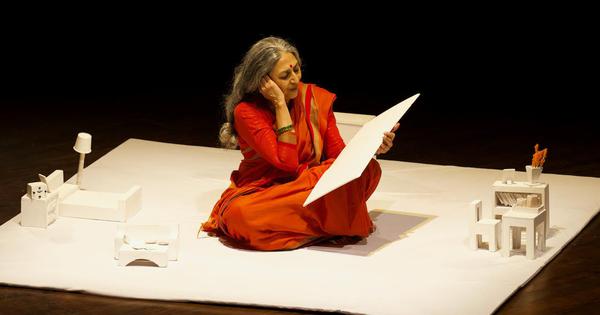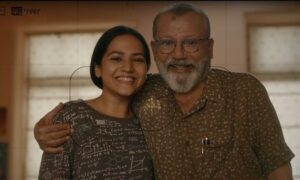
Even before the play Apne Ghar Jaisa (Think of This as your Home) has begun, the dank undertones of its title already alert the sensitive spectator to the play’s intent.
Theatre director Anmol Vellani’s powerfully quiet and disturbing Hindi adaptation of British playwright Barry Bermange’s 1960s play Oldenberg, written at a time when immigration into Britain was peaking and race relations were growing restive, is a play for our times in India.
The growing majoritarianism is plain to see. This everyday bigotry is the play’s material and context.
But what makes works like Ranga Shankara’s Apne Ghar Jaisa stand out is their refusal to mount an obvious and strident critique. The play prefers to work with a deceptively subdued political charge which, even in the absence of any polemics (or perhaps because of it), leads quite naturally to searching questions about the role of the arts and what kind of artistic responses feel right in a particular set of social circumstances as exist in India today.
Vellani believes that the play quite plainly asks “spectators to confront certain truths about the social world they inhabit”. But although that may be construed as a statement of purpose, he is not one to develop creative strategies to elicit a particular response from the audience. Such an approach, he believes, is puerile and destined to fail.
Visceral experience of conflict
The play is virtually a solo act with senior actor and theatre person Padmavati Rao delivering a performance that fronts her conflict and its wildly shifting emotional registers for the spectator. She goes from being quite normal at first to confessional, conspiratorial, loud, delusional, scheming, evasive and, finally, piteous.
Long after the play has ended, that visceral experience of the conflict up close and its emotional brutality leaves us with questions that are difficult to dodge. Unlike in Oldenberg, where the husband and wife speak xenophobic lines and their context and politics can be placed by the audience, in Apne Ghar Jaisa, we are in the midst of an unremarkable woman’s sly everyday bigotry as it is practised in Indian society. The approach is allegorical and requires audiences to observe and read the play more closely.
Rao plays a middle-class Marathi woman in Mumbai whose husband has decided that they could do with an additional income and should take in a paying guest. On the day that the new tenant is expected to visit the house, the husband is away on urgent business, leaving his wife to receive the tenant named Shakeen. The woman mistakenly hears it as Shokeen.
The ambiguity of that name goes on to trigger a chain of thoughts that seem ordinary at first before building up to a malevolence one wouldn’t expect from this harried, talkative middle-aged woman. But by now we have learnt of her great sorrow, the loss of a young son whose room has been locked up with things as they always were. This is the spare room to be offered to the tenant and she bounds around the room rearranging things and airing her thoughts non-stop.
She is torn between the need to be perceived as the welcoming hostess while in reality she struggles to disguise her suspicions and absence of warmth ; a double hand and contradiction women like her have learnt to live with, unaware of the build-up of resentment that such duplicity inevitably fosters and the toll it takes on their inner life.
Rao who also worked at turning a basic translation into a malleable and natural performance text, manages the complex range of emotions, bringing a veracity to the performance without which the play, for all the cleverness of its construct, could have fallen flat.
“Every time I visit the character, we find something new that needs to be included or something that’s jaded that needs to be enlivened or even discarded,” she said. Despite its three-year run, Rao says she feels that they are still in rehearsal. “Every time I perform I feel like I’ve become all that I never want to be,” she said, indicating the likely source for the unsettling edginess that courses through the performance.
In choosing to be oblique, one of the significant differences between the original play and this adaptation is that the husband’s role is eliminated and the wife is on stage alone. This worked out very effectively because you get a sense of everything – from her relationship with her husband to her feelings about her son to her own private thoughts – heightening both how central she is to the play but also how lonely and confused she is. This device allows, in the words of the director, “grey and unvoiced moments for audiences to fill with their own meanings”.
With its tightly coiled energy and critique of things as they are today, the play also has a calibration of distance and even an aloofness from the majoritarianism that overpowers us on a daily basis in India today. But it also hits very hard and deeper than perhaps a more clearly and overtly political play may have. This is both a paradox and a measure of its artistic success.
Vellani continued to tinker with the play after its initial run nearly three years ago when he observed that the protagonist was coming across as too angry too soon and spectators felt offended or alienated. “I had to make her more relatable,” he said. “This meant softening her performance, seeing to it that she sounded reasonable at the start, rather than strident, irrational and fearful. I had to establish a clearer emotional graph for her, starting with small doubts and suspicions and building gradually to the stronger emotions of rage, panic, hysteria and disgust.”
A quiet resolution
Audiences aren’t usually made to see what everyday bigotry leads to, but Apne Ghar Jaisa takes them through the cycle of suspicion, speculation and wild unfounded assumptions ending in unimaginable, needless pain. This is specially notable because a deadly combination of neoliberalism and authoritarianism around the world has diminished the traditional arsenal of artists and the space accorded to ask difficult and inconvenient questions. The arts themselves for the most part have become a safe, anodyne activity.
As the play races to its end, for a fleeting moment the woman comes face to face with her bigotry and is ashamed and embarrassed. But perhaps we shouldn’t read too much into that.
The play as a work of art does not really require the woman to redeem herself before us. Having brought us to this moment the play’s artistic arc is complete when we leave with questions in our minds that can help us reason out our own often ambivalent positions and politics. All of which the play does with unusual insistence and power.
Devina Dutt is co-founder and director of performing arts organisations First Edition Arts and Kishima Arts Foundation in Mumbai and Bangalore.
Apne Ghar Jaisa will be performed at Mumbai’s Prithvi Theatre this week.
This article first appeared on Scroll.in
📰 Crime Today News is proudly sponsored by DRYFRUIT & CO – A Brand by eFabby Global LLC
Design & Developed by Yes Mom Hosting






